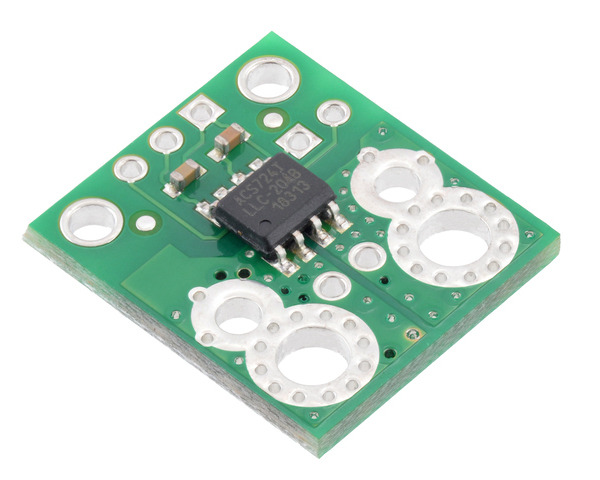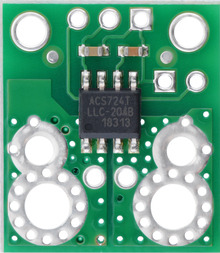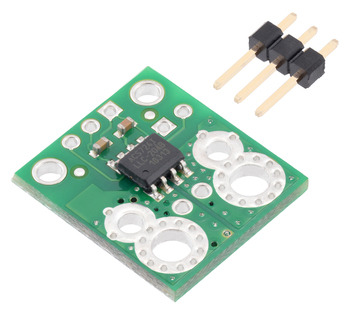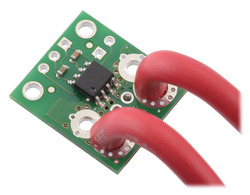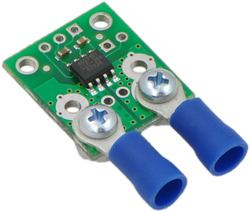Sensors » Current Sensors » ACS724 Current Sensor Carriers »
ACS724 Current Sensor Carrier -20A to +20A
This board is a simple carrier of Allegro’s bidirectional ±20A ACS724LLCTR-20AB Hall effect-based linear current sensor, which offers a low-resistance (~1.2 mΩ) current path and electrical isolation up to 2.4 kV RMS. This version accepts a bidirectional current input with a magnitude up to 20 A and outputs a proportional analog voltage (100 mV/A) centered at 2.5 V with a typical error of ±0.8%. It operates from 4.5 V to 5.5 V and is intended for use in 5 V systems.
Alternatives available with variations in these parameter(s): version Select variant…
| Description | Specs (9) | Pictures (8) | Resources (4) | FAQs (0) | On the blog (1) |
|---|
Overview
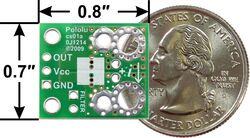 |
This current sensor is a carrier board or breakout board for Allegro’s ACS724 Hall effect-based linear current sensors; we therefore recommend careful reading of the ACS724 datasheet (1MB pdf) before using this product. The following list details some of the sensor’s key features:
- Differential Hall sensing rejects common-mode fields, the orientation of the sensor relative to the Earth’s magnetic field does not affect the measurement
- The conductive path internal resistance is typically 1.2 mΩ, and the PCB is made with 2-oz copper, so very little power is lost in the board.
- Use of a Hall effect sensor means the IC is able to electrically isolate the current path from the sensor’s electronics (up to 2.4 kV RMS), which allows the sensor to be inserted anywhere along the current path and to be used in applications that require electrical isolation.
- High 120 kHz bandwidth for faster response times in control applications.
- Filter pin allows user to filter the output for improved resolution at lower bandwidth.
- Integrated digital temperature compensation circuitry allows for near closed loop accuracy over temperature in an open loop sensor.
- Automotive-grade operating temperature range of -40°C to 150°C.
The pads are labeled on the bottom silkscreen, as shown in the picture to the right. The silkscreen also shows the direction that is interpreted as positive current flow via the +i arrow.
We sell a ±5A bidirectional version, a ±20A bidirectional version, a ±50A bidirectional version, a 10A unidirectional version, and a 30A unidirectional version of this board, so you should consider adding your own distinguishing marks or labels if you will be working simultaneously with multiple versions. A white box is provided on the bottom silkscreen of the board to make labeling easier. You can also distinguish the versions by reading the text on the IC.
Details for item #4045
|
|
This carrier features the ACS724LLCTR-20AB-T, which operates at 5 V and is designed for bidirectional input current from -20 A to +20 A. When Vcc is 5 V, the output voltage is centered at 2.5 V and changes by 100 mV per amp of input current, with positive current increasing the output voltage and negative current decreasing the output voltage.
This board ships assembled with all surface mount components, and a 3×1 strip of 0.1″ header pins is included but not soldered in.
Using the sensor
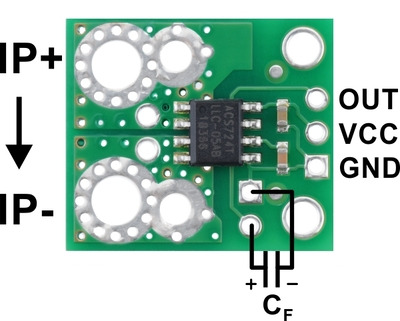 |
This sensor has five required connections: the input current (IP+ and IP-), logic power (VCC and GND), and the sensor output (OUT).
The sensor requires a supply voltage of 4.5 V to 5.5 V to be connected across the VCC and GND pads, which are labeled on the bottom silkscreen, and the sensor outputs an analog voltage that is linearly proportional to the input current.
The FILTER pin lets you adjust the board’s bandwidth by adding a capacitor to ground (a ground pad has been added next to the FILTER pin for convenience) in parallel with the 1 nF capacitor that is already on the board. Without an added external filter capacitor, the bandwidth is about 90 kHz. The datasheet provides more information on how the filter capacitors affect bandwidth.
You can insert the board into your current path in a variety of ways. For low-current applications, you can solder 0.1″ male header pins to the board via the smallest pair of through-holes on the input-current side of the board. For higher-current applications, you can solder wires directly to the through-holes that best match your wires, or you can use solderless ring terminal connectors. The largest pair of through-holes are big enough for #6 screws.
|
|
Warning: This product is intended for use below 30 V. Working with higher voltages can be extremely dangerous and should only be attempted by qualified individuals with appropriate equipment and protective gear.
Schematic and dimension diagrams
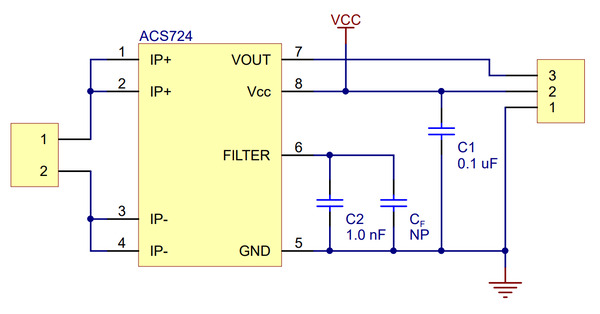 |
Schematic diagram of the ACS724 Current Sensor Carrier. |
|---|
The dimension diagram is available as a downloadable PDF (323k pdf).
People often buy this product together with:
 |
ACHS-7121 Current Sensor Carrier -10A to +10A |
 |
ACS724 Current Sensor Carrier -5A to +5A |
 |
ACS724 Current Sensor Carrier 0 to 10A |
